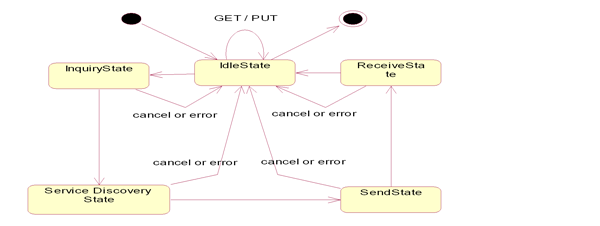Implementing the Comm module
The Comm module (implemented in the com.nokia.example.bcexchanger.comm package) handles all Bluetooth and OBEX operations for the MIDlet.
It consists of the following classes:
ExchangeListener—This callback interface is implemented by theBCExchangerMIDlet. By means of the interface methods, the OBEX communication module signals to a listener about various networking events.ExchangerComm—This interface contains methods representing the functionality of the OBEX communication module to the other classes of the MIDlet. The OBEX communication module implemented by the Comm module classes realizes the exchange of the business card over the OBEX API. The control of the module is abstracted in this interface.ExchangerCommImpl—This class is the central class in the OBEX communication module. TheBCExchangerMIDletcalls the methods of theExchangerComminterface (implemented by theExchangerCommImplclass) to control the process of sending and receiving business cards.The
ExchangerCommImplclass is also a parent for the states of the communication state machine: it keeps the current state of the state machine and implements theExchangerStateParentinterface. Using theExchangerStateParentinterface, the state classes can access the required functionality of the parent.The
ExchangerCommImplclass waits for an incoming Bluetooth connection in a separate thread and therefore implements theRunnableinterface. TheExchangerCommImplclass also works as an OBEX server. To serve OBEX requests, it extends theServerRequestHandlerclass and overrides some of its methods.ExchangerState—This class is an abstract base class for all the states of the communication state machine. Each state implements only those methods which can be executed in that particular state.ExchangerStateParent—This interface contains the function used by the state to address the functionality of theExchangerCommImplparent class . It includes the methods which the states of the communication state machine use to get certain functionality from the parent.IdleState—This class implements the idle state of the communication state machine. In the idle state, the machine waits for external events, such as incoming Bluetooth connections or a user command to start a card exchange. TheIdleStateclass extends theExchangerStateabstract class.InquiryState—This class represents the state of the running inquiry. In this state, an active device discovery is performed and no OBEX server commands are handled. TheInquiryStateclass extends theExchangerStateabstract class, and implements theDiscoveryListenerinterface to receive Bluetooth inquiry callbacks.ReceiveState—This class represents the state when a business card is received from the remote device. In this state, the client OBEX GET operation is performed, and no OBEX server commands are handled.SendState—This class represents the state when a business card is sent to the remote device. In this state, the client OBEX PUT operation is performed, and no OBEX server commands are handled. TheSendStateclass extends theExchangerStateabstract class.ServiceDiscoveryState—This class represents the state of the running service discovery. In this state, an active service discovery is performed and no OBEX server commands are handled. TheServiceDiscoveryStateclass extends theExchangerStateabstract class and implements theDiscoveryListenerinterface to receive Bluetooth service discovery callbacks. The service discovery procedures are run from a separate thread, and therefore the class also implements theRunnableinterface.
The following figure shows the state machine diagram of the Comm module. When the MIDlet initiates the exchange of cards, the normal state change flow is "idle > inquiry > service discovery > send > receive > idle". However, each state can be canceled or can end in an error, in which case the execution of the exchange process ends and the MIDlet returns to the idle state.

Figure: Comm module state diagram
Accepting a connection is implemented as serving OBEX GET and PUT requests, and therefore it is done without a state change. However, note that the state machine has to be in the idle state to serve the OBEX requests. In other words, the MIDlet is always ready to accept a card exchange from a remote device if it is not currently performing an active exchange itself.
To create the Comm module:
Now that you have implemented the Comm module, implement the Address Book module.